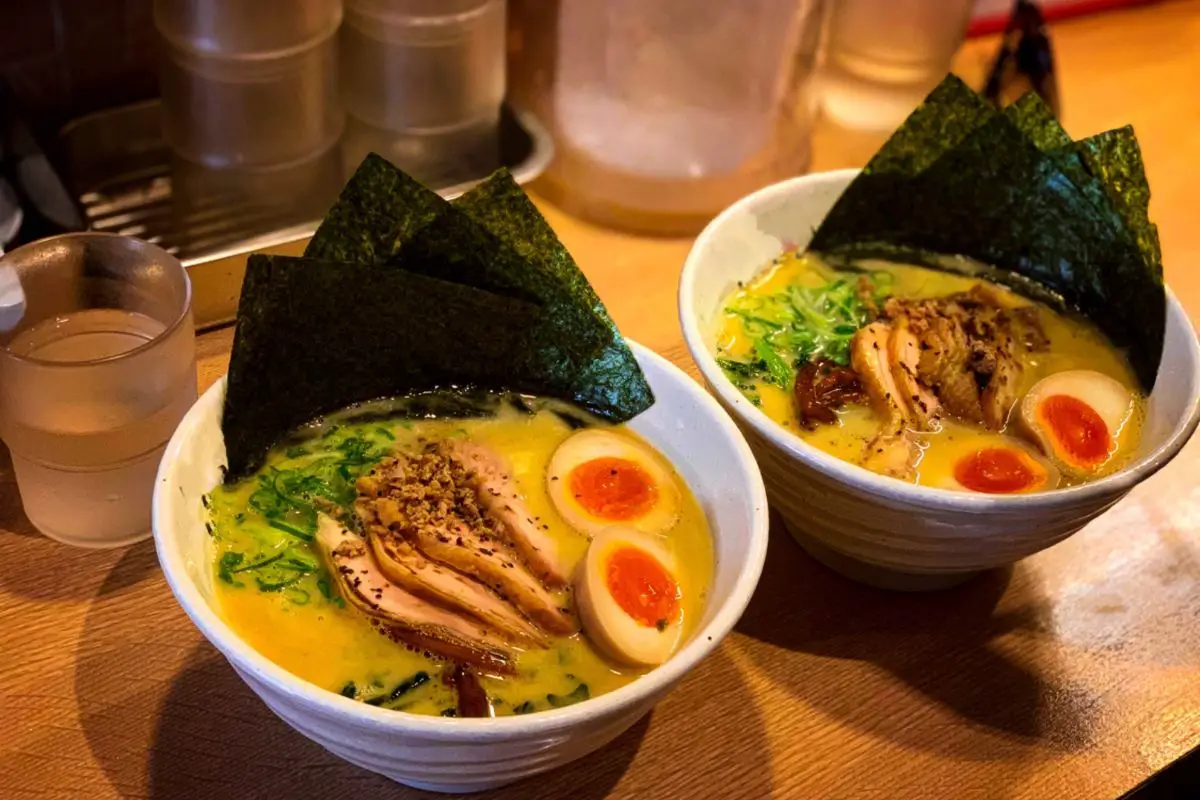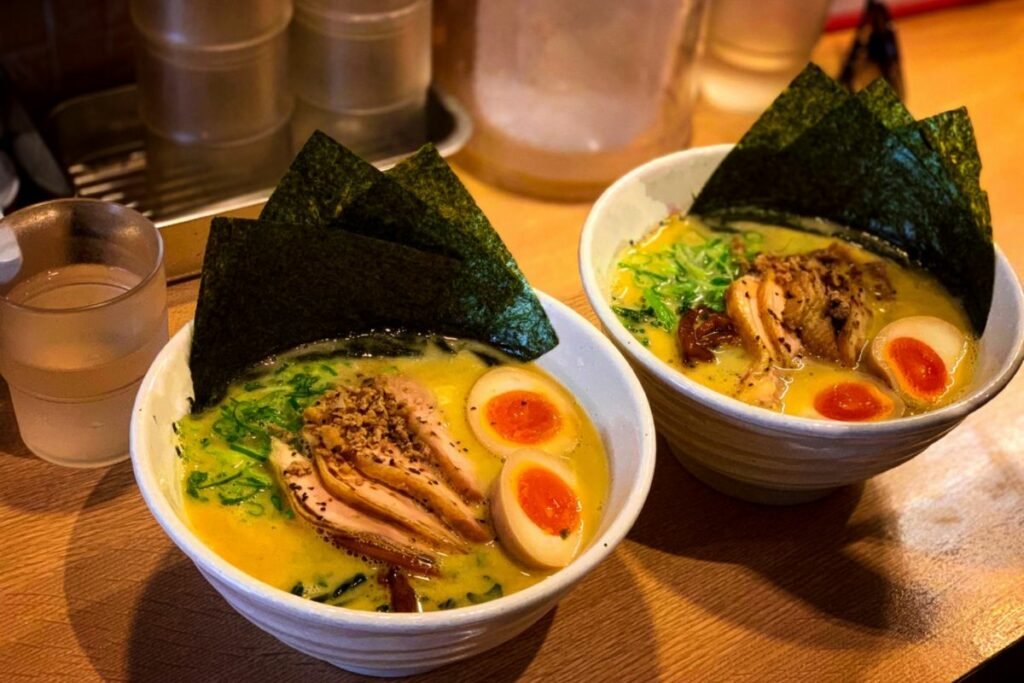Whether you eat a lot of ramen or not, a question that’s well worth asking is how often you should eat it.

The simple answer is that it’s not really necessary to eat ramen often as part of your diet. But if you enjoy eating ramen, then it’s best to eat it in moderation and as part of a balanced, healthy diet – like almost all other popular meals.
The reason for this is that ramen can be high in sodium, saturated fat, and calories. So if consumed often, it can lead to weight gain and health problems.
A varied, balanced diet is also important overall, so eating raman on a regular basis is generally not recommended.
That’s the answer in a nutshell. But for more must-know information on ramen, make sure to keep reading.
What Is Ramen Made from?
To better understand why it’s generally not recommended to eat ramen often, it’s important to know what it’s made from!
Ramen is a Japanese noodle soup dish made from wheat noodles served in a savory broth, with other toppings and seasonings added to enhance the flavor, texture, and appeal.
In general, the main ingredients in ramen are:
- Wheat noodles
- Broth
- Toppings
- Seasonings
The broth in ramen is usually made from meat stock, like pork, chicken, or beef. The toppings are also meat-based or protein-based, such as pork, chicken, beef, or a soft-boiled egg, and can also involve vegetables.
As for the seasonings, these can be various ingredients, such as garlic, ginger, or herbs.
Overall, ramen has all the components of a balanced meal: protein, vegetables, and carbohydrates. But in most cases due to how it’s prepared, ramen is not always a healthy meal option.
Is Ramen Healthy?

Unfortunately there is no single answer to whether ramen is healthy, as it can be healthy or unhealthy depending on the ingredients used and how it is prepared. Factors include:
- The quality of the ingredients
- The type of noodles
- The toppings and seasonings
- How it’s cooked
- Portion size
Another important factor is the type of ramen, as whether it is instant ramen, homemade ramen, or ramen bought from a street food vendor or restaurant will also affect how healthy the ramen is.
For example, instant ramen or ramen bought from a vendor will typically be less healthy than preparing the ramen at home using your own ingredients.
So, ultimately, it boils down to the ingredients used in the recipe!
Despite that, ramen is generally high in sodium, fat, and calories, which can lead to weight gain, high cholesterol, and other health problems.
How Many Calories Are In Ramen?
Since ramen is made with different ingredients, as well as bought in different forms from brands, vendors, and restaurants, the number of calories in ramen will vary greatly depending on several factors, including the ingredients used, how it’s cooked, and the portion size.
In general, however, the amount of calories in a typical ramen dish can be anything from 200 to 900 calories.
While this might not sound like a lot if you’re watching your weight, it’s worth remembering that ramen is typically high in fat and carbohydrates, which, like calories, can also lead to weight gain.
Is Ramen Good For Weight Loss?
The calories, carbohydrates, and fat content in ramen means it isn’t widely considered a good weight loss food. Most ramen is also high in sodium, which is another factor that can contribute to weight gain as opposed to weight loss.
Despite that, it’s possible to enjoy ramen as part of a balanced diet, or even a weight loss diet, if prepared with healthy ingredients or consumed in moderation as part of a caloric deficit.
For example, ramen can be healthier if made with a light vegetable broth, lean meats or plant-based protein, more vegetables, and noodles that are lower in calories and carbohydrates.
Can You Eat Ramen Every Day?
Whether you find ramen cheap to buy, easy to make, or simply your favorite meal that you can’t get enough of, it’s not recommended to eat ramen every day (Why is ramen so cheap? Find out here).
This is because ramen is often high in sodium, calories, carbohydrates, and saturated fats, which can all lead to weight gain and health complications if consumed in excess.
Another reason is that a varied, balanced diet is recommended for nutritional purposes over eating the same food every day. As a result, even eating a dish that’s considered healthy every day can mean missing out on important nutrients the body needs to function optimally.
The Pros And Cons Of Ramen

Finally, to help you weigh up how often you should eat ramen, let’s run through the pros and cons ramen brings to the table.
The Pros Of Eating Ramen
1. It’s tasty and filling: Ramen is made with a variety ingredients, which can make it both a tasty and filling meal.
2. It’s convenient: Ramen can be bought or easily made.
3. It’s affordable: Ramen is generally considered a cheap meal option.
4. It’s versatile: Ramen can be made with different ingredients, toppings, and seasonings, as well as eaten any time of day.
5. It’s comforting: Ramen is a popular “comfort food” when sick or even in a bad mood.
The Cons Of Eating Ramen
1. It’s high in sodium: Ramen is generally high in sodium, which can lead to weight gain and health problems.
2. It’s high in calories and fat: Ramen is sometimes high in calories, which can lead to weight gain and health problems.
3. It can be low in nutrients: Ramen, especially if bought as instant ramen, can be low in essential nutrients like protein, fiber, vitamins, and minerals.
4. It can contain artificial flavors and preservatives: Ramen bought from food vendors or instant ramen brands may contain artificial flavors and preservatives, which can be harmful to health.
Conclusion
To conclude, ramen is generally not considered to be a healthy meal option, so it’s not necessary to eat it often and nor should it be eaten on a regular basis. Despite that, it’s possible to make ramen with healthier ingredients, as well as enjoy it in moderation as part of a healthy, balanced diet.









